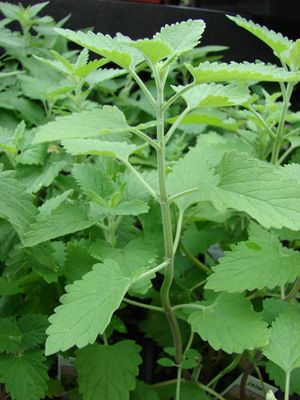Note: This is a project under development. The articles on this wiki are just being initiated and broadly incomplete. You can Help creating new pages.
Difference between revisions of "Nepeta cataria - Catnip"
m (Prabhakar moved page Cantip (Nepeta cataria) to Nepeta cataria - Cantip) |
(→Uses) |
||
| Line 6: | Line 6: | ||
==Uses== | ==Uses== | ||
| − | {{Uses|Wounds}}, {{Uses|Cuts}}, {{Uses|Snakebites}}, {{Uses|Curing liver disorders}}, {{Uses|Skin eruptions}}, {{Uses|Blotches}}, {{Uses|Pimples}}, {{Uses|Diarrhea}}, {{Uses|Sore throats}} | + | {{Uses|Wounds}}, {{Uses|Cuts}}, {{Uses|Snakebites}}, {{Uses|Curing liver disorders}}, {{Uses|Skin eruptions}}, {{Uses|Blotches}}, {{Uses|Pimples}}, {{Uses|Diarrhea}}, {{Uses|Sore throats}}. |
==Parts Used== | ==Parts Used== | ||
Revision as of 14:54, 17 April 2018
Nepeta cataria, commonly known as catnip, catswort, or catmint, is a species of the genus Nepeta in the family Lamiaceae, native to southern and eastern Europe, the Middle East, central Asia, and parts of China. It is also widely naturalized in northern Europe, New Zealand, and North America.The common name catmint can also refer to the genus as a whole. The names catnip and catmint are derived from the intense attraction most cats have towards them.
Contents
Uses
Wounds, Cuts, Snakebites, Curing liver disorders, Skin eruptions, Blotches, Pimples, Diarrhea, Sore throats.
Parts Used
Chemical Composition
Nepetalactones 4aα, 7α, 7aα-nepetalactone; 3,4β-dihydro-4aα, 7α, 7aα-nepetalactone; 4aα, 7α, 7aβ-nepetalactone and β-caryophyllene, five new constituents were identified: dimethyl-3,7 oxa-1 bicyclo [3,3,0] oct-2-ene, piperitone, thymol methyl ether, hexenyl benzoate and humulene oxide[1]
Common names
| Language | Common name |
|---|---|
| Kannada | |
| Hindi | |
| Malayalam | |
| Tamil | |
| Telugu | |
| Marathi | NA |
| Gujarathi | NA |
| Punjabi | NA |
| Kashmiri | NA |
| Sanskrit | |
| English | Agrimony |
Habit
Identification
Leaf
| Kind | Shape | Feature |
|---|---|---|
| Simple | long-stemmed | Opposite, long-stemmed. Blade cordate–ovate, with tapering tips, hairy, large-toothed. inflorescence’s lowest subtending bracts similar to stem leaves, upper ones small, narrow |
Flower
| Type | Size | Color and composition | Stamen | More information |
|---|---|---|---|---|
| Unisexual | white with red spots | Stamens 4 | Flowering time is July–August and these are Corolla irregular |
Fruit
| Type | Size | Mass | Appearance | Seeds | More information |
|---|---|---|---|---|---|
| schizocarp | Flowering time is september to december | With hooked hairs | {{{6}}} |
Other features
List of Ayurvedic medicine in which the herb is used
- Vishatinduka Taila as root juice extract
Where to get the saplings
Mode of Propagation
How to plant/cultivate
Nepeta cataria is cultivated as an ornamental plant for use in gardens. It is also grown for its attractant qualities to house cats and butterflies. The plant is drought-tolerant and deer-resistant. It can be a repellent for certain insects, including aphids and squash bugs. Catnip is cultivated in drained soils, enriched with peat and manure[3]
Commonly seen growing in areas
Tall grasslands, meadows, Borders of forests and fields.
Photo Gallery
References
External Links
http://www.missouribotanicalgarden.org/PlantFinder/PlantFinderDetails.aspx?kempercode=e433 http://eol.org/pages/595653/overview
- Pages that are stubs
- Ayurvedic Herbs known to be helpful to treat Wounds
- Ayurvedic Herbs known to be helpful to treat Cuts
- Ayurvedic Herbs known to be helpful to treat Snakebites
- Ayurvedic Herbs known to be helpful to treat Curing liver disorders
- Ayurvedic Herbs known to be helpful to treat Skin eruptions
- Ayurvedic Herbs known to be helpful to treat Blotches
- Ayurvedic Herbs known to be helpful to treat Pimples
- Ayurvedic Herbs known to be helpful to treat Diarrhea
- Ayurvedic Herbs known to be helpful to treat Sore throats
- Herbs with Dried Folaige used in medicine
- Herbs with Whole herb used in medicine
- Herbs with common name in English
- Habit - Herb
- Index of Plants which can be propagated by Seeds
- Index of Plants which can be propagated by Cuttings
- Herbs that are commonly seen in the region of Tall grasslands
- Herbs that are commonly seen in the region of meadows
- Herbs that are commonly seen in the region of Borders of forests and fields
- Herbs



